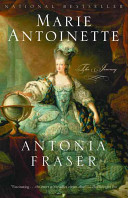Was she a sexual predator, political meddler, wastrel, and traitor? Or was she a scapegoat for a corrupt and bankrupt nation, who went with superb dignity to the guillotine, the victim of a vindictive judicial murder? The tragic life of Marie Antoinette, rich in conflicting detail, remains a biographer’s challenge, and Antonia Fraser’s richly human yet evenhanded account is a reader’s delight. In 1770, Marie Antoinette, aged 14, wed the awkward 16-year-old who in 1774 became Louis XVI. The marriage was intended to strengthen the Austrian-French alliance and produce sons to continue it. Marie Antoinette was of little use in the first endeavor; she lacked political power. Louis was of only occasional help in the second; he suffered from phimosis, an inhibiting physical condition. While the pair wandered through their doomed lives, fury built up in bankrupt France, exploding in the ferocity of the Revolution. Everybody criticized Marie, who was known both as l’Autrichienne (the Austrian woman) and l’autruche chienne (the ostrich bitch). She was regarded as extravagant (Madame Deficit”)
Marie Antoinette: The Journey
$18.95
1 in stock
Additional Information
| Author | Antonia Fraser |
|---|---|
| Publisher | Anchor |
| Year Published | 2002 |
| Binding Type | Softcover |
|---|
